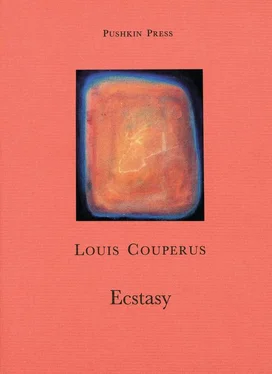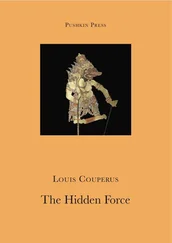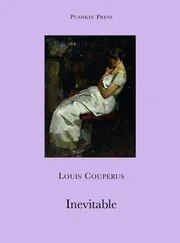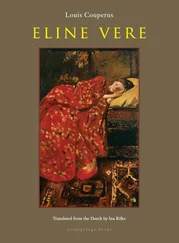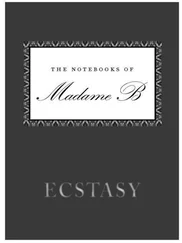So she did not see him for weeks, weeks. Life went on; each day she had her little occupations, in her household, with her children; Mrs Hoze reproached her for her sequestration from society, and she began to think more about her friends, to please Mrs Hoze. There were vistas in her memory; in those vistas she saw the dinner-party, their conversations and walks, all their love, all his aspiration to her he called madonna; their last evening of light and ecstasy. Then she smiled, and the smile itself beamed over her anguish; her anguish that she no longer saw him, that she felt proud and had bitterness within her. Yet all things must be well, as he wished them.
Oh, the evenings, the summer evenings, cooling after the warm days, the evenings when she sat alone, peering out from her room, where the onyx lamp burnt with a half flame, peering out of the open windows at the trams which, tinkling their bells, came and went to Scheveningen, full, full of people. Waiting, the endless, long waiting, evening after evening in solitude, after the children had gone to bed. Waiting, when she simply sat still, staring fixedly before her, looking at the trams, the tedious, everlasting trams. Where was her former evenness of dreaming happiness? And where, where was her supreme happiness? Where was her struggle within herself between what she was and what he thought she was? This struggle no longer existed; this had been overcome; she no longer felt the force of passion; she only longed for him as he had always come, as he now no longer came. Why did he not come? Happiness palled, people spoke about them … It was not right that they should see so much of one another – he had said so the evening before that highest happiness – not good for him and not good for her.
So she sat and thought, and great, quiet tears fell from her eyes, for she knew that although he remained away partly on his own account, it was above all on hers that he did not come to her. What had she not said to him that evening on the bench in the woods, when her arms were about his neck? Oh! she should have been silent, she knew that now. She should not have uttered her rapture, but have enjoyed it secretly within herself; she should have let him utter himself; she herself should have remained his madonna. But she had been too full, too happy, and in that overbrimming of happiness she had been unable to be other than true and clear as a bright mirror. He had glanced into her and comprehended her entirely: she knew that, she was certain of that.
He knew now in what manner she loved him; she herself had revealed it to him. But, at the same time, she had made known to him all that was past, that now she was what he wished her to be. And this had been true at that moment, clear at that moment, and true. But now? Does ecstasy endure only for one moment then, and did he know it? Did he know that her soul’s flight had reached its limit, and must now descend again to a commoner sphere? Did he know that she loved him again now, quite ordinarily, with all her being, wholly and entirely, no longer as widely as the heavens, only as widely as her arms could stretch out and embrace? And could he not return her this love, so petty, and was that why he did not come to her?
II
Then she received his letter:
“Forgive me that I put off from day to day coming to see you; forgive me that even today I cannot decide to do so, and that I write to you instead. Forgive me if I even venture to ask you whether it may not be necessary that we see each other no more. If I hurt you and offend you, if I – God spare me – cause you to suffer, forgive me, forgive me. Perhaps I procrastinated a little from indecision, but much more because I thought I had no other choice.
“There has been between our two lives, between our two souls, a rare moment of happiness which was a special blessedness, a special grace. Do you not think so too? Oh, if only I had words to tell you how thankful I am in my innermost soul for that happiness. If later I ever look back upon my life, I shall always continue to see that happiness gleaming in between the ugliness and the blackness – a star of light. We received it as such – a gift of light. And I venture to ask you if that gift is not a thing to be kept sacred?
“Shall we be able to do so if I continue to see you? You, yes, I have no doubt of you; you will be strong to keep it sacred, our blessed happiness, especially as you have already done battle, as you confided to me, that holy evening. But I, shall I too be able to be strong, especially now that I know that you have gone through the struggle? I doubt myself, I doubt my own force; I am afraid of myself. There is cruelty in me, the love of destruction, something of the savage. As a boy I took pleasure in destroying beautiful things, in breaking and soiling them.
“The other day Jules brought me some roses to my room; in the evening, as I sat alone, thinking upon you and upon our happiness – yes, at that very moment – my fingers began to fumble with a rose whose petals were loose, and when I saw that one rose dis-petalled there came a rage within me to tear and destroy them all, and I rumpled every one of them. I only give you small instances, I do not wish to give a larger instance, from vanity, lest you should know how bad I am. I am afraid of myself. If I saw you again, and again, and again, what should I begin to feel and think and wish, unconsciously? Which would be the stronger within me, my soul or the beast that is in me?
“Forgive me that I lay bare my dread before you, and do not despise me for it. Up to now I have not done battle in the blessed world of our happiness. I saw you, I saw you often before I knew you; I imagined you as you were; I was allowed to speak to you; it was given me to love you with my soul alone: I beseech you let it remain so. Let me continue to guard my happiness like this, to keep it sacred, a thousand times sacred. I think it worth while to have lived now that I have known that: happiness, the highest. I am afraid of the battle which would probably come and pollute that sacred thing.
“Will you believe me when I swear to you that I have reflected deeply on all this? Will you believe me when I swear to you that I suffer at the thought of never being permitted to see you again? Above all, will you forgive me when I swear to you that I am acting in this way because I think I am doing right? Oh! I am thankful to you, and I love you as a soul of light alone, only light!
“Perhaps I do wrong to send you this letter. I do not know. Perhaps I will presently destroy what I have written …”
Yet he had sent the letter.
There was bitterness within her. She had done battle once, had conquered herself, and in a sacred moment had confessed both battle and conquest; she knew that fate had compelled her to do so; she now knew that through this confession she would lose him. For a short moment, a single evening perhaps, she had been worthy of her god, and his equal. Now she was so no longer; for that reason too she felt bitter; and bitterest of all because the thought dared to rise within her:
“A god! Is he a god? Is a god afraid of battle?”
Then her threefold bitterness changed to despair, black despair, a night which her eyes sought to penetrate in order to see where they saw nothing, nothing, and she moaned low, and wrung her hands, sunk into a heap before the window, and peered at the trams which, with the tinkling of their bells, ran pitilessly to and fro.
III
She shut herself up; she saw little of her children; she told her friends that she was ill. She was at home to no visitors. She guessed intuitively that in their respective circles people spoke of Quaerts and herself. Life hung dull about her, a closely woven web of tiresome meshes, and she remained motionless in her corner, to avoid entangling herself in those meshes. Once Jules forced his way to her; he went up to her in spite of Greta’s protests; he sought her in the little boudoir, and, not finding her, went resolutely to her bedroom. He knocked without receiving any reply, but entered nevertheless. The room was half in darkness, for she kept the blinds lowered; in the shadow of the canopy which rose above the bedstead, with its hangings of old blue brocade, Cecile lay sleeping. Her dressing-gown was open over her breast, the train fell from the bed and lay creased over the carpet; her hair trailed over the pillows; one of her hands clutched nervously at the tulle bed-curtain.
Читать дальше
